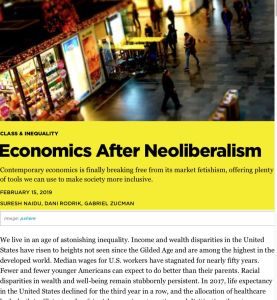Join getAbstract to access the summary!

Join getAbstract to access the summary!
Suresh Naidu, Dani Rodrik and Gabriel Zucman
Economics After Neoliberalism
Contemporary economics is finally breaking free from its market fetishism, offering plenty of tools we can use to make society more inclusive.
Boston Review, 2019
What's inside?
Modern economics needs a fresh way of thinking to address inequality and improve prosperity.
Recommendation
Economists Suresh Naidu, Dani Rodrik and Gabriel Zucman survey the policy recommendations of members of the Economics for Inclusive Prosperity (EfIP) group, a coalition of academics seeking a fresh vision for the dismal science. Their study finds that, by rejecting long-held beliefs and focusing on equality, economists can offer more suitable policy recommendations. This thought-provoking report concludes that to achieve “inclusive prosperity,” economics must embrace ideas that correct the power imbalances present in markets and society.
Summary
About the Authors
Suresh Naidu, Dani Rodrik and Gabriel Zucman are professors at Columbia University, Harvard University, and the University of California, Berkeley, respectively.



























Comment on this summary